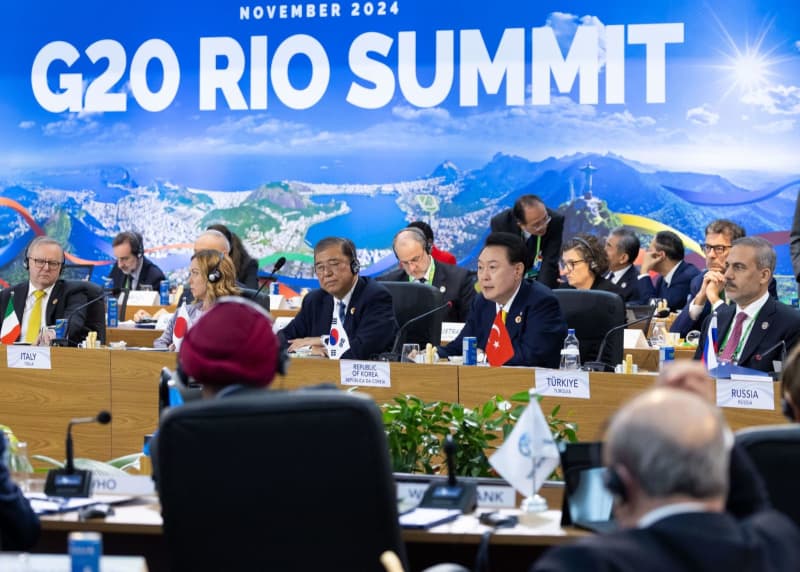The G20 summit in Rio de Janeiro commenced with a surprising success as delegates issued a final declaration on the first day, albeit featuring only generalized remarks concerning the ongoing conflicts in the Middle East and Ukraine. The Brazilian government, which is hosting the summit, effectively influenced the agenda to include critical issues like the fight against hunger and climate change and emphasized the need for reform within international organizations. Amidst the gathering of leaders from the world’s major industrialized nations and emerging economies, there was a collective aspiration for more effective taxation on wealthy individuals. The leaders reaffirmed their commitment to limit global warming to within 1.5 degrees Celsius, compared to pre-industrial levels. Despite some apprehension about potential contention arising from Argentina’s newly elected president, Javier Milei, the G20 successfully crafted an extensive 85-point declaration, showcasing a strategic collaboration among nations.
One of the crucial agreements reached during the summit was regarding the reform of the United Nations Security Council. The final declaration voiced the demand for a council that is more “representative, inclusive, efficient, effective, democratic, and accountable.” This reflects a growing acknowledgment among G20 nations of the need to address global governance inadequacies. In stark contrast to prior summits, particularly last year’s in Bali, the Rio declaration did not condemn Russia’s military actions in Ukraine and instead opted for a more cautious phrasing. The text referenced “immense human suffering” caused by conflicts but refrained from detailing specific aggressors or conflicts, indicating a careful balance of interests among member countries.
The summit also initiated the Global Alliance Against Hunger and Poverty, a significant step in addressing hunger, which Brazilian President Luiz Inácio Lula da Silva emphasized is a consequence of political will rather than resource scarcity. Lula highlighted the alliance as one of the core thematic focuses of Brazil’s G20 presidency and expressed a desire for the group to collaborate on strategies to enhance food security. The initiative has garnered support from 81 nations, demonstrating a united front on combating these entrenched issues. Established organizations like the Inter-American Development Bank committed substantial funding—$25 billion—toward this initiative, illustrating a collective willingness to tackle poverty and hunger on a larger scale.
Despite the intense political situation in the Middle East, the summit’s declaration notably failed to mention the recent attack by Hamas on Israel, which resulted in significant civilian casualties. This omission drew criticism, particularly from Israeli officials who urged the G20 to recognize Israel’s right to self-defense and condemn terrorist organizations. Instead, the declaration expressed concern over the humanitarian crisis in Gaza and the escalating situation in Lebanon. The summit maintained a broader support for Palestinian self-determination and advocated for a two-state solution, indicating a commitment to finding peaceful resolutions while also denoting a shift in how member nations address these complex issues.
President Lula also stressed the necessity for enhanced multilateralism, advocating for reforms in global institutions to reflect a more inclusive and stable international framework. He argued that genuine stability hinges on diverse voices being represented in decision-making bodies. Lula’s remarks stressed the urgency of reforming organizations like the UN Security Council and criticized established institutions like the World Bank and IMF for inadequately addressing the needs of developing nations. He warned that waiting for crises to spur change would be detrimental, pushing instead for a proactive approach to reshape the international order based on emerging multipolar dynamics.
Lula’s call for reform resonates with the ongoing discourse surrounding the legitimacy and functionality of global governance structures in today’s complex world. The Brazilian president’s vision of a more inclusive approach is not merely about improving representation but also about recognizing the changing power dynamics amongst nations. By prioritizing these reforms, Lula aims to foster a more balanced and equitable global landscape that enhances collective security and stability. As the summit unfolds, it remains to be seen how member nations will commit to these ambitious agendas and whether they can translate discussions into tangible actions towards addressing global challenges.

